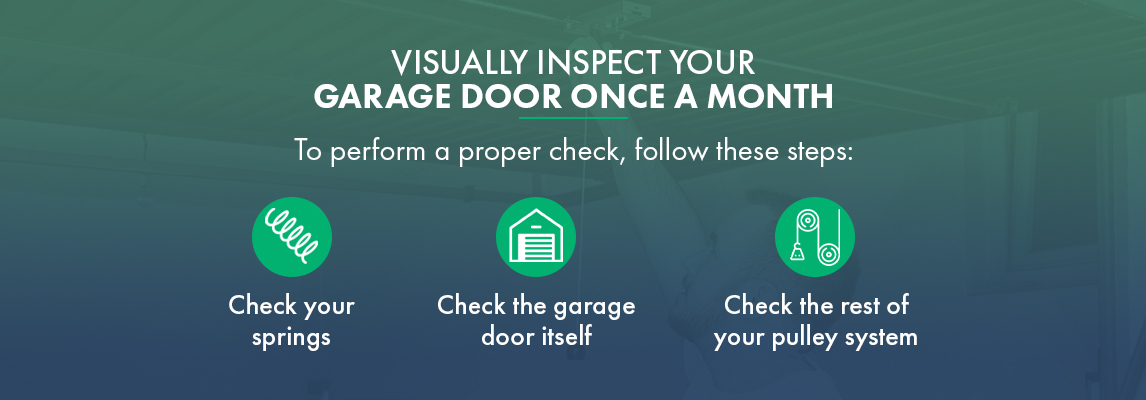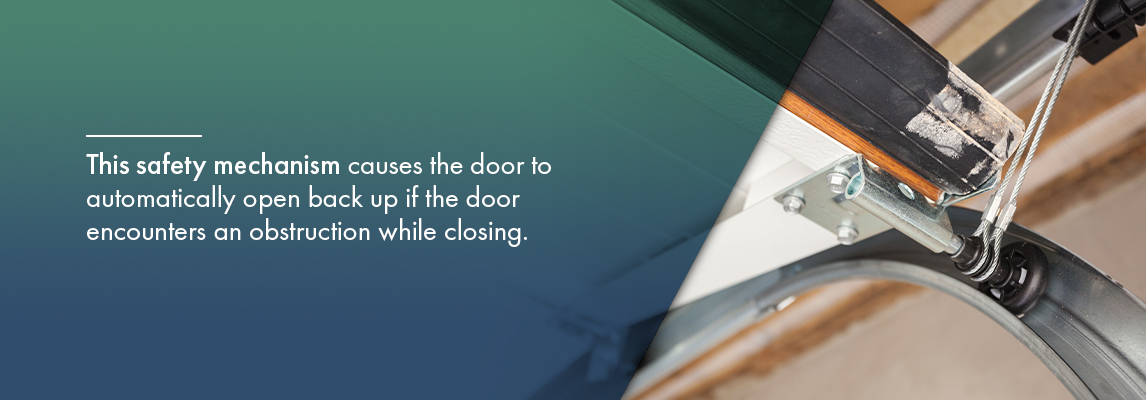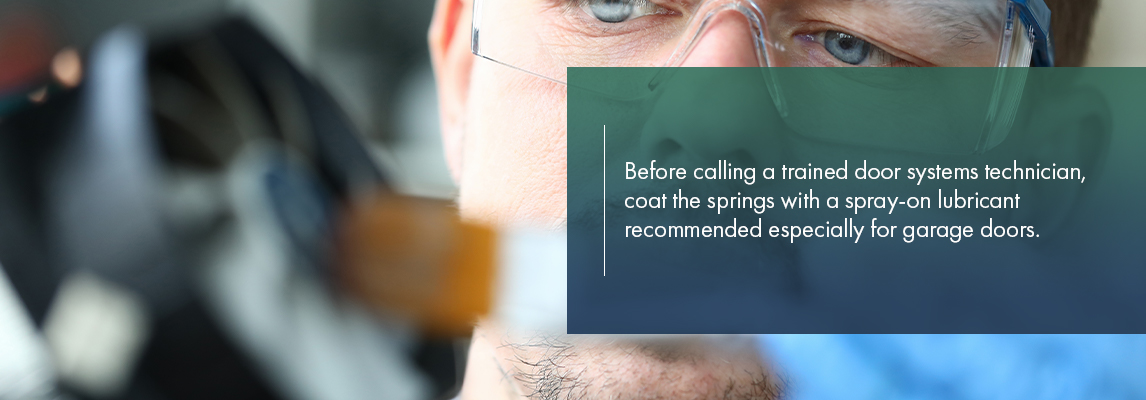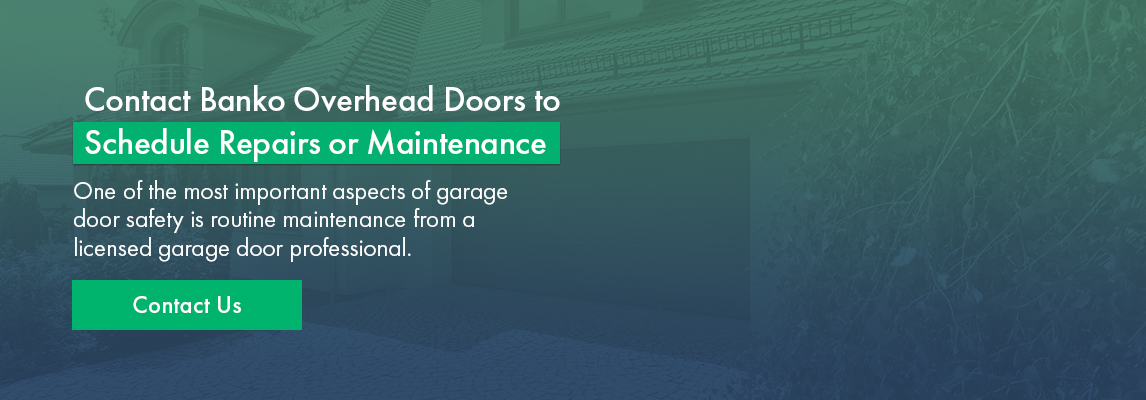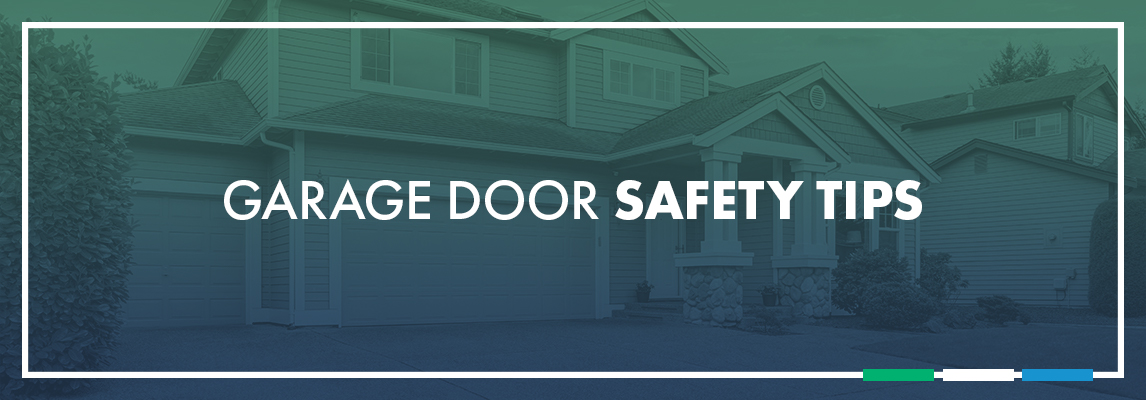
To ensure garage doors stand strong against extreme weather, security threats and other potential incidents, they’re designed to be heavy. However, their bulkiness also poses certain safety hazards, especially to children and pets.
To help you and your family operate your garage door safely, we’ll discuss common garage door safety issues, review some safety features of new garage doors and provide a wealth of safety tips. Additionally, we’ll show you a few simple routine inspections you can perform to ensure your garage door remains in working order. Let’s take a look at the safety features of garage doors and openers.
Table of Contents
- Garage Door Safety Considerations
- Garage Door Child Safety Information
- Have a Professional Garage Door Technician Complete Repairs and Maintenance
- Contact Banko Overhead Doors to Schedule Repairs or Maintenance
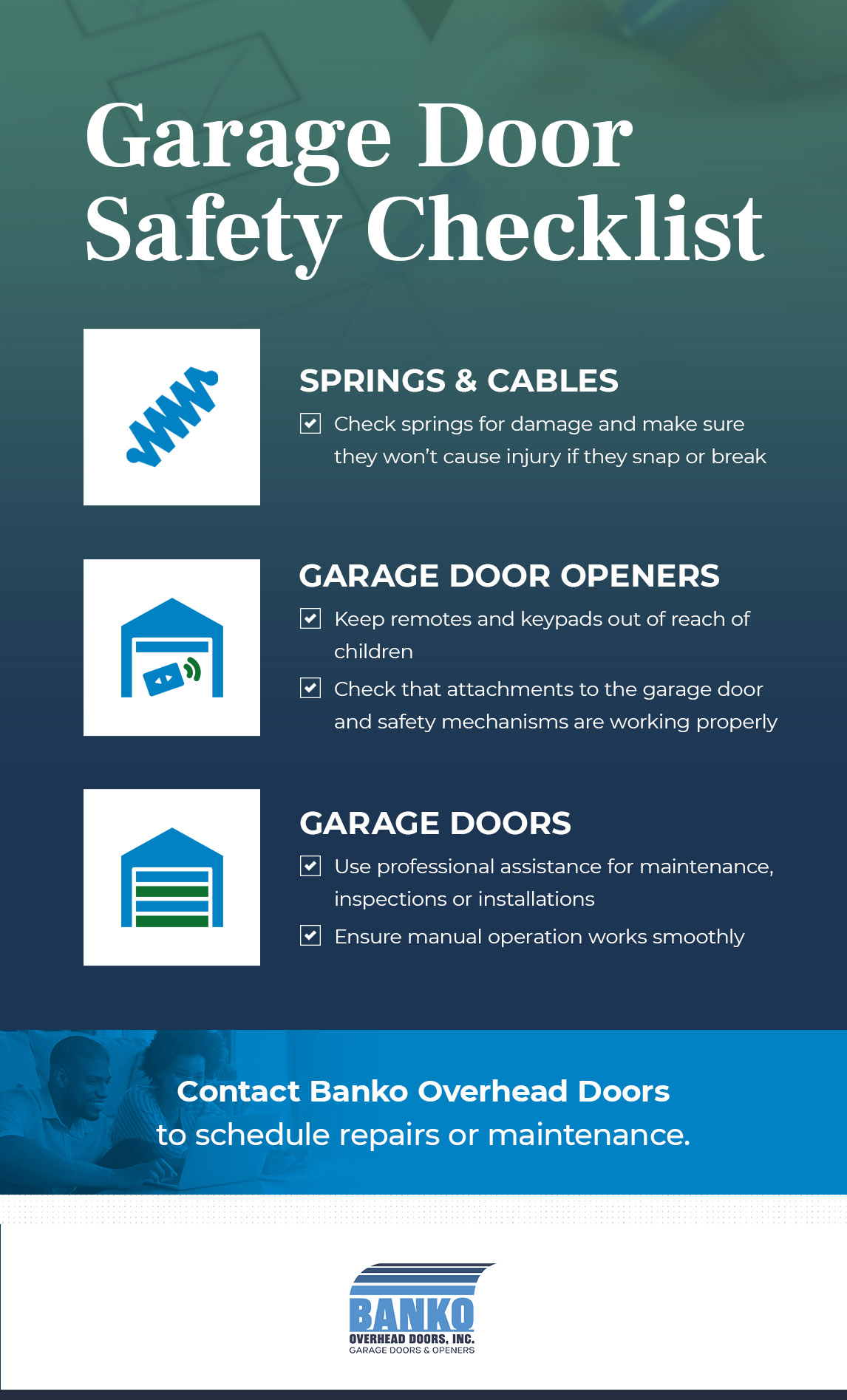
Garage Door Safety Considerations
As long as you operate and maintain your garage door properly, you can expect it to last several years. In this section, we’ll show you how to adopt all the best garage door safety practices. Here are 13 safety features to consider with garage doors.
1. Visually Inspect Your Garage Door Once a Month
Even if you’re not a trained garage door professional, you can still perform a basic garage door safety inspection every month. To perform a proper check, follow these steps:
- Check your springs: The springs are an essential aspect of a garage door because they’re load-bearing. For this reason, they need to have enough strength to raise your door and hold it in place so it won’t fall down. See whether your springs are rusty or showing other signs of wear. If they are, you’ll want a professional technician to perform an inspection. Avoid touching or attempting to repair or replace these springs yourself.
- Check the garage door itself: Does your door have any sharp or rusty edges that could be dangerous to people or pets? If left unattended, rust can eat away at the garage door’s structural integrity. Calling in an expert to assess these areas will be helpful.
- Check the rest of your pulley system: Make sure your pulley system is in top shape. If you happen to have a lubricant on hand, you can lubricate the system’s moving parts. However, under no circumstances should you try to touch or adjust any parts by yourself, particularly the primary springs. The main springs, which are under great tension, require a trained, licensed specialist to adjust them. If a spring snaps, it could lead to serious injury or even death.
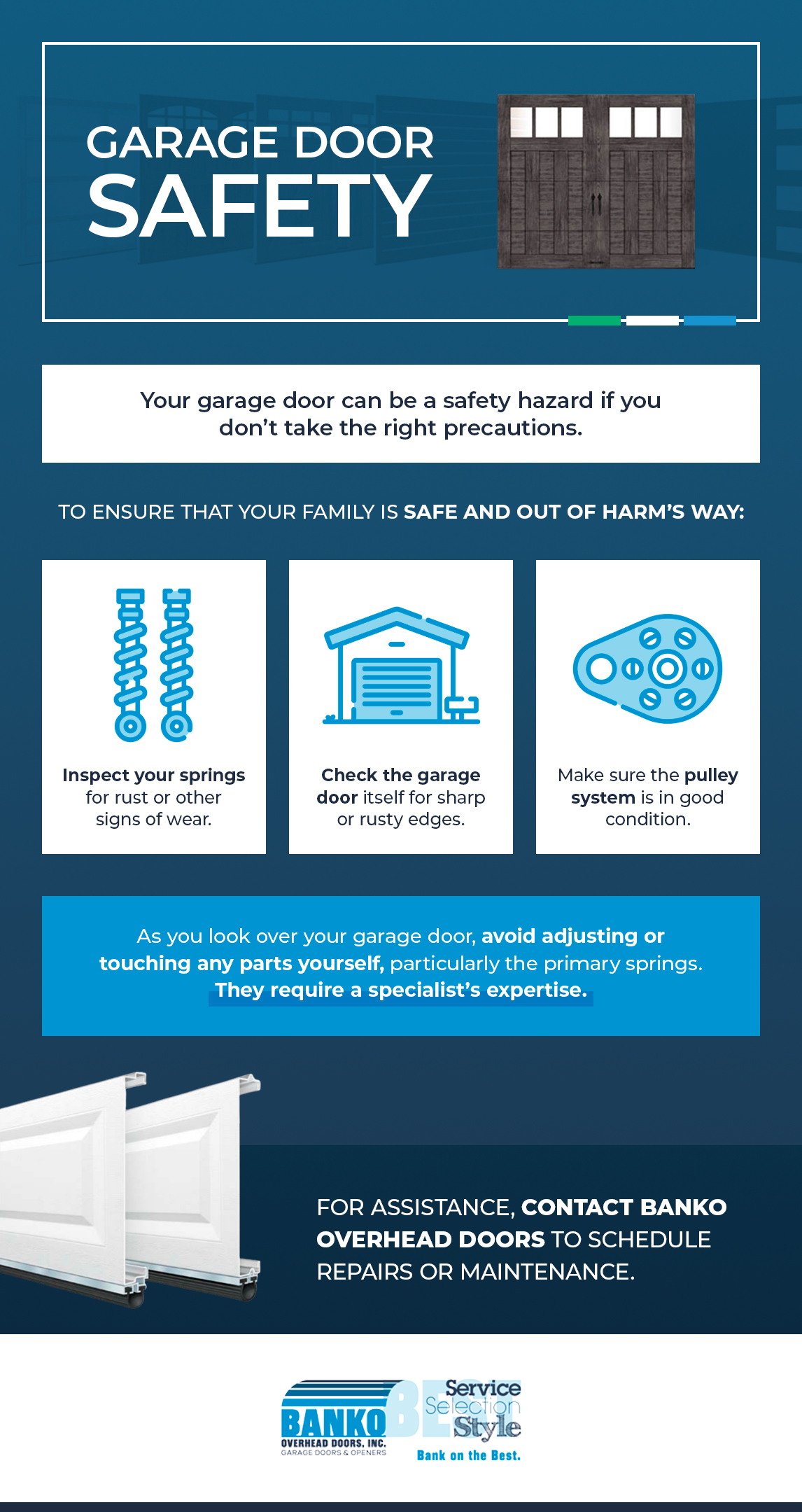
2. Replace Old Springs
Your garage door’s springs are arguably the most important part of your garage door — but they’re also the most dangerous. If the springs wear out and break, the door could collapse and cause injury. For this reason, we recommend that a trained garage door technician inspects them to ensure garage door spring safety. If your door has two springs, it’s important to replace both even if only one is broken. This step will prevent any damage caused by the breaking of the second spring and keep your door working efficiently.
3. Test Your Reversing Mechanism
When you perform your monthly visual inspections, you should also test the reversing mechanism, which is a new safety feature found on all garage doors made in the last 30 years. It’s a legal safety requirement for garage doors.
This safety mechanism causes the door to automatically open back up if the door encounters an obstruction while closing. To test this feature, we recommend using a roll of paper towels. Because paper towels are soft and can’t hold up a door, they’re a helpful way to determine whether your door can detect an obstruction that offers minimal resistance. Simply put the roll on the floor in the path of the door and close it. If the mechanism is working properly, the door should reverse and start to open back up again upon touching the roll.
If these sensors aren’t working, contact a professional technician right away, and let everyone in your family know so they can take extra caution when operating the door. Until an expert can repair this mechanism, keep an eye on the door when closing it to ensure nothing obstructs its path.
4. Check Your Garage Door Cables
Garage door safety for cables is fundamental. Visually inspect the cables that attach the spring system to the bottom brackets on both sides of the door. If these cables appear frayed or worn, they’re at risk of breaking, which can create a potentially hazardous situation. Due to the risks associated with high spring tension, it’s essential for homeowners to hire a trained garage door technician to repair these cables.
5. Lubricate Your Springs
Squeaky springs? Springs can squeak and be noisy. This is caused by normal use and does not necessarily indicate a problem. Before calling a trained door systems technician, coat the springs with a spray-on lubricant recommended especially for garage doors. If the noise persists, call a trained garage door technician for service.
6. Use the Safety Release Properly
Additionally, remember to use your garage door safety release properly. Ensure your garage is disengaged before attempting to use the emergency pull. When you pull the cord, do so toward the door to engage the motor correctly. Using this feature carefully will ensure you can still open your door when the power goes out.
7. Make Sure Your Extension Springs Have Containment Cables
If your garage door has extension springs, a containment cable should run through each spring and connect to the wall or ceiling at each end. When your garage door is closed, extension springs are under high tension. If a spring breaks, a potentially hazardous situation can occur. A containment cable can keep that broken spring contained. If you have extension springs without containment cables, call Banko Overhead Doors for a garage door safety check.
8. Keep Your Spring Systems in Top Shape
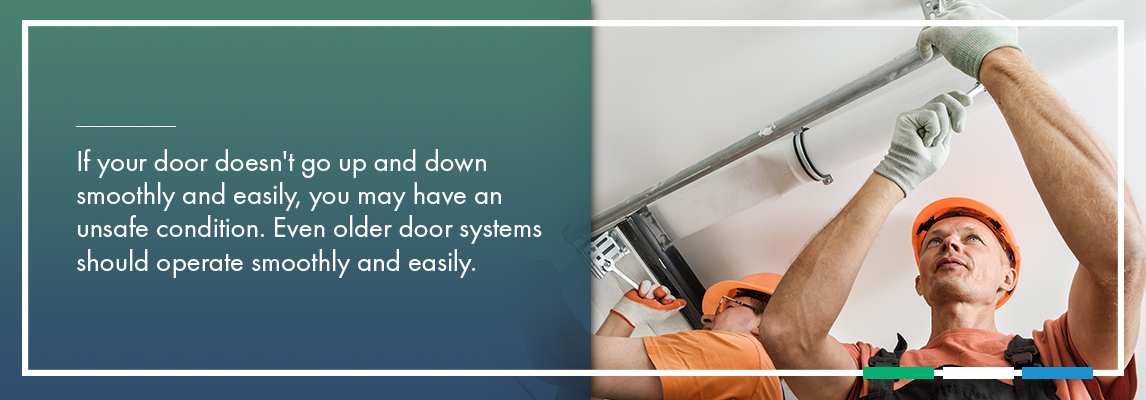
If your door doesn’t go up and down smoothly and easily, you may have an unsafe condition. Even older door systems should operate smoothly and easily. If this operational difficulty continues when manually operating the door, you may have an unbalanced spring system. This issue can cause premature wear and tear on other important door components. Repairing or replacing spring systems can be hazardous, so you’ll always want to have trained door systems technicians complete the work.
9. Watch Your Fingers
If your door lacks pinch-resistant joints, you should have lift handles or suitable gripping points on the inside and outside of the door. Even if your door has a motor operator, you still have to operate the door manually on occasion, so manual garage door safety is just as important as automatic garage door safety. Never place your fingers between the door sections. If you manually open or close the door, use the lift handles or gripping points.
10. Don’t Touch the Bottom Brackets
Since the bottom brackets on a garage door are connected to the door’s springs, these brackets are constantly under extreme tension. If needed, only a trained door systems technician should adjust them.
11. Use the Old Track
When buying a replacement garage door, some homeowners want to save a few dollars by putting the new door on the old track. However, your old track may not fit with your new door, depending on the thickness of your sections, the weight of the door, the headroom required, the location of the garage door operator and other considerations. The track and sections work together as a system. For maximum performance and longer life, you should use the track designed and supplied for your specific door.
12. Service Your Garage Door Regularly
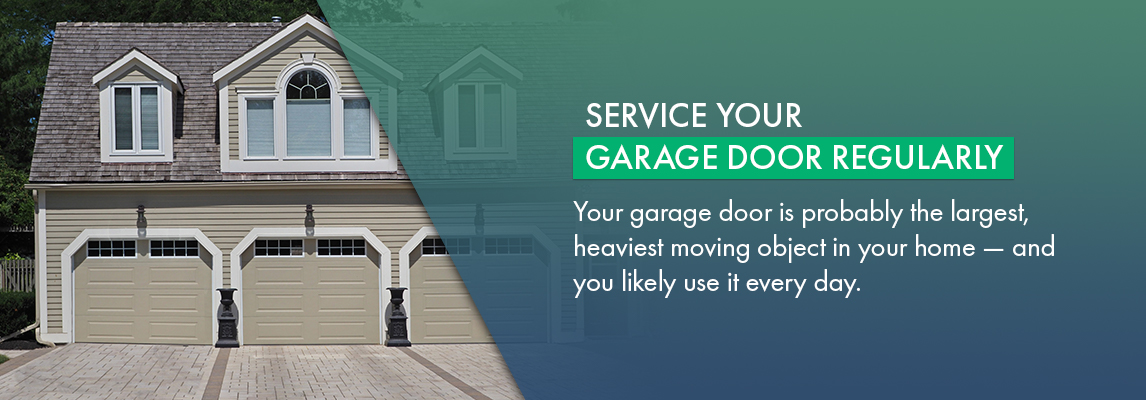
Your garage door is probably the largest, heaviest moving object in your home — and you likely use it every day. Over time, parts can wear down and break, creating potential hazards. Although you should conduct monthly safety checks and provide regular limited maintenance to your garage door system, an annual visit from a trained door systems technician can keep your door operating safely and smoothly for a long time. Be sure to prioritize these checks each year.
13. Man the Manual
Keep the owner’s manuals for your door and the operator near the door for easy reference. Every model of door and operator has specific safety instructions unique to that model. Where is your manual? For a replacement copy, contact Banko Overhead Doors.
Garage Door Child Safety Information
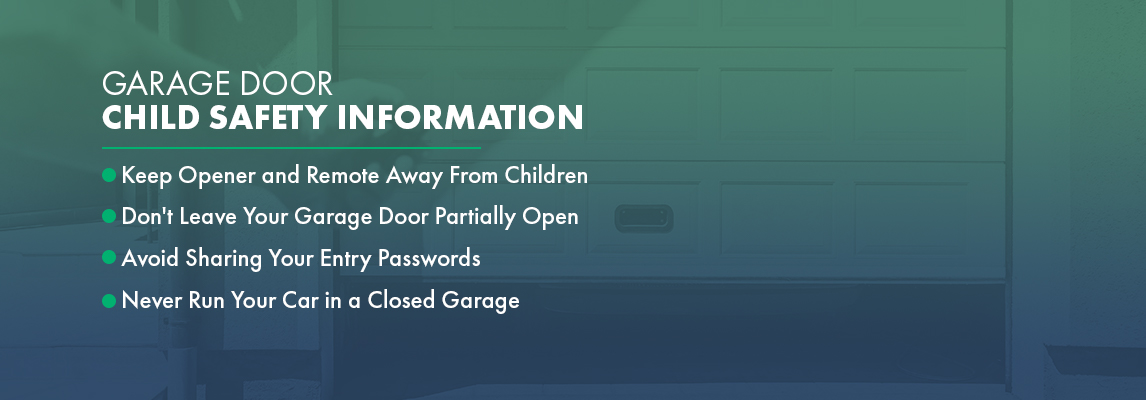
A guide on residential garage door safety wouldn’t be complete without a section on child safety. Once your kids have reached a certain age, educate them about how to use your garage door correctly so they can avoid injuries. Here are some important simple lessons you can impart to help them stay safe:
- The garage door isn’t a toy.
- Before you close the door, be sure there’s no one in the way.
- The door should always be closed if no one’s outside.
- Never tell anyone the entry code — not even friends.
1. Keep Opener and Remote Away From Children
One of the most important garage door opener safety requirements is to keep it away from your children.
Being able to control the movement of a large garage door with a simple push of a button is intriguing for anyone who uses it — especially children. As children tend to enjoy harnessing this power, some parents feel tempted to hand the remote over to their children, providing them with the opportunity to help them out while they park their car.
However, giving young children control of the garage door remote isn’t recommended even when they’re supervised. Many kids have so much fun pressing the garage door opener they’ll likely want to play with the remote when their parents aren’t around, as well. This situation is one you’ll definitely want to avoid.
Make sure the garage door opener is out of the reach of small children by using the 5-foot rule – mounts openers at least 5 feet above the floor. If children can touch the garage door opener and have the chance to potentially misuse it, it can cause serious injury. As far as garage door opener safety features go, correct placement is a must.
2. Don’t Leave Your Garage Door Partially Open
You’ve probably noticed some homes keep their garage doors partially open, usually by about 1 foot. This trick is especially common in hotter climates, as it helps keep the homes cooler and allows pets to easily get back inside. However, we don’t recommend leaving your garage door open like this regularly, as it does pose several threats.
For one, a cracked garage door may attract wild animals looking for shelter or food. A wild animal can cause significant damage to your garage and anything you store there. Also, burglars will see slightly opened garage doors as opportunities to enter your home. By making an effort to keep your garage door closed whenever no one is outside to monitor it, you can easily avoid these potential dangers.
3. Avoid Sharing Your Entry Passwords
A keypad that can open your garage door is extremely convenient and is especially useful during an emergency. If you forget the key to the house, the keypad will allow you to gain entry safely if your garage is attached to your home. However, we strongly discourage you from sharing your entry passwords with people outside of your household.
If there are immediate family members living nearby, you could give them the passcode, but remember that the more people who know your password, the lower its effectiveness will be in keeping your family and belongings safe. It’s critical to teach your children the importance of not sharing your passcode. Make it clear as a garage door opener safety tip that you, their parent, is the one who chooses and knows the code.
4. Never Run Your Car in a Closed Garage
Although not as directly related to garage door safety as the previous tips, it’s crucial to remember to never run your vehicle — even for 30 seconds — when in your garage with the garage door closed. As you know, carbon monoxide is released in car exhaust, which is extremely toxic. It’s also odorless and can quickly poison humans, not to mention smaller children, who can feel its negative effects with even lower doses.
Therefore, even in cold weather, make sure your garage door is open before turning your engine on.
Have a Professional Garage Door Technician Complete Repairs and Maintenance
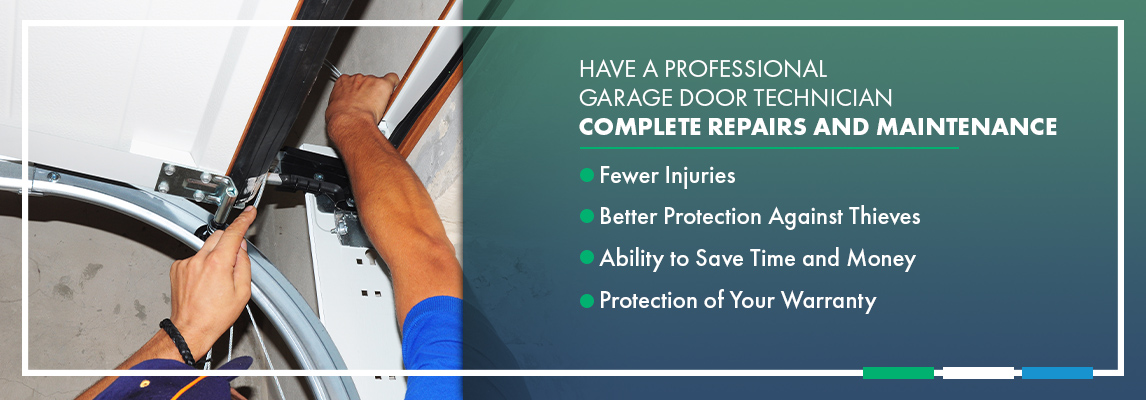
This last section is perhaps the most important of all. With the abundance of DIY tips and videos online, many homeowners feel tempted to perform a number of garage door repairs themselves. However, just because DIY videos exist for a certain task doesn’t mean you should use them, as the risk of serious injury is high, and failing to do the repair properly can have disastrous consequences. It’s best to work with a professional to help you meet garage door safety requirements.
Below are five reasons we strongly urge you to leave your garage door repairs and maintenance in the hands of experienced professionals:
1. Fewer Injuries
Every year, there are thousands of garage door-related injuries, many of which occur when people attempt to repair their garage door themselves. However, as you know by now, garage doors are dangerous for homeowners to repair, which is in part due to their heaviness.
They’re also dangerous due to their springs, which are under a large amount of tension. This tension is also intentional, making the door easier to raise. However, if something goes awry with these springs, the door will come crashing down its track to the floor. If you or someone else happens to be in the door’s path when it falls, this could result in serious injury.
Professional garage door repair technicians undergo extensive safety training to minimize the risk of injury while working with garage doors. They’re aware of all the potential dangers of a garage door and are equipped with the right tools to minimize these dangers. They can finish the job correctly and efficiently, ensuring your door will function without any issues. These tasks include the right alignment for the photo eye, proper securing for the door opening, correct wiring and perfectly installed pulleys, cables and springs. They’ll need to balance the door properly, as well.
Even if you manage to fix your garage door without injury, there’s still a good chance you haven’t taken the proper steps, which poses a great danger to you and your loved ones. By hiring a professional to fix or maintain your garage door, you’re eliminating the risk of serious injury.
2. Better Protection Against Thieves
If your garage door isn’t functioning properly, everything it protects — your home, cars and tools — all become vulnerable to burglars. Even if you think you can repair your garage door, keep in mind that the longer you wait, the greater the likelihood of a robbery.
Contacting a garage repair company right after you first notice any sign of malfunction is the quickest and simplest way to prevent your home from being burglarized. These professional technicians understand how important it is for your garage door to be repaired promptly and properly.
3. Ability to Save Time and Money
DIY-ing your garage door repairs can take you longer than having a professional company handle the repairs. In addition to the time it’ll take to repair the door yourself, you’ll probably also need to take the time to buy certain tools and educate yourself on how things work.
While a YouTube video may give you the impression that installing a garage door is easy, that’s far from the truth. These videos usually feature professionals with years of experience, which is why it often appears so easy. If you have no experience, installing a garage door can be extremely dangerous and challenging. Professional garage door technicians possess the skills needed to perform the job correctly.
We understand many homeowners attempt to repair their garage doors themselves because they worry about the costs of hiring a professional. However, by attempting to fix the door yourself, you very well may end up causing new issues that will cost you more money down the road.
Unless you have the expertise required to repair your door quickly, you’ll ultimately be wasting your time and money. A professional can quickly diagnose the issue and repair it much faster. Let a professional repair it properly the first time so you don’t end up putting your money into a neverending issue.
4. Protection of Your Warranty
If you attempt repairs yourself, you may inadvertently void the warranty of your door, which means you may have to replace the door sooner than you’d prefer. Unlike a professional, you won’t be able to fall back on a workmanship warranty, either. To protect that warranty, hiring a professional will be your best bet.
Contact Banko Overhead Doors to Schedule Repairs or Maintenance
One of the most important aspects of garage door safety is routine maintenance from a licensed garage door professional. Whether you want to check off commercial garage door safety requirements or residential garage door safety requirements, a professional will be your best bet. These experts will tackle any issues in the safest way possible, providing garage door safety information along the way to ensure you’re informed.
If you live in Tampa Bay or the surrounding area, the garage door professional you’ll want is Banko Overhead Doors, Tampa Bay’s leading service provider and installer of garage doors and openers for over almost four decades.
If you’d like to learn more about garage door safety features, our services or to schedule an appointment, fill out our online form and one of our representatives will assist you promptly.
Additional Resources on Garage Tips and Tricks:
- Garage Upgrade Ideas to Add Value
- Garage Door Trends
- When To Replace a Garage Door
- Parts of a Garage Door System

